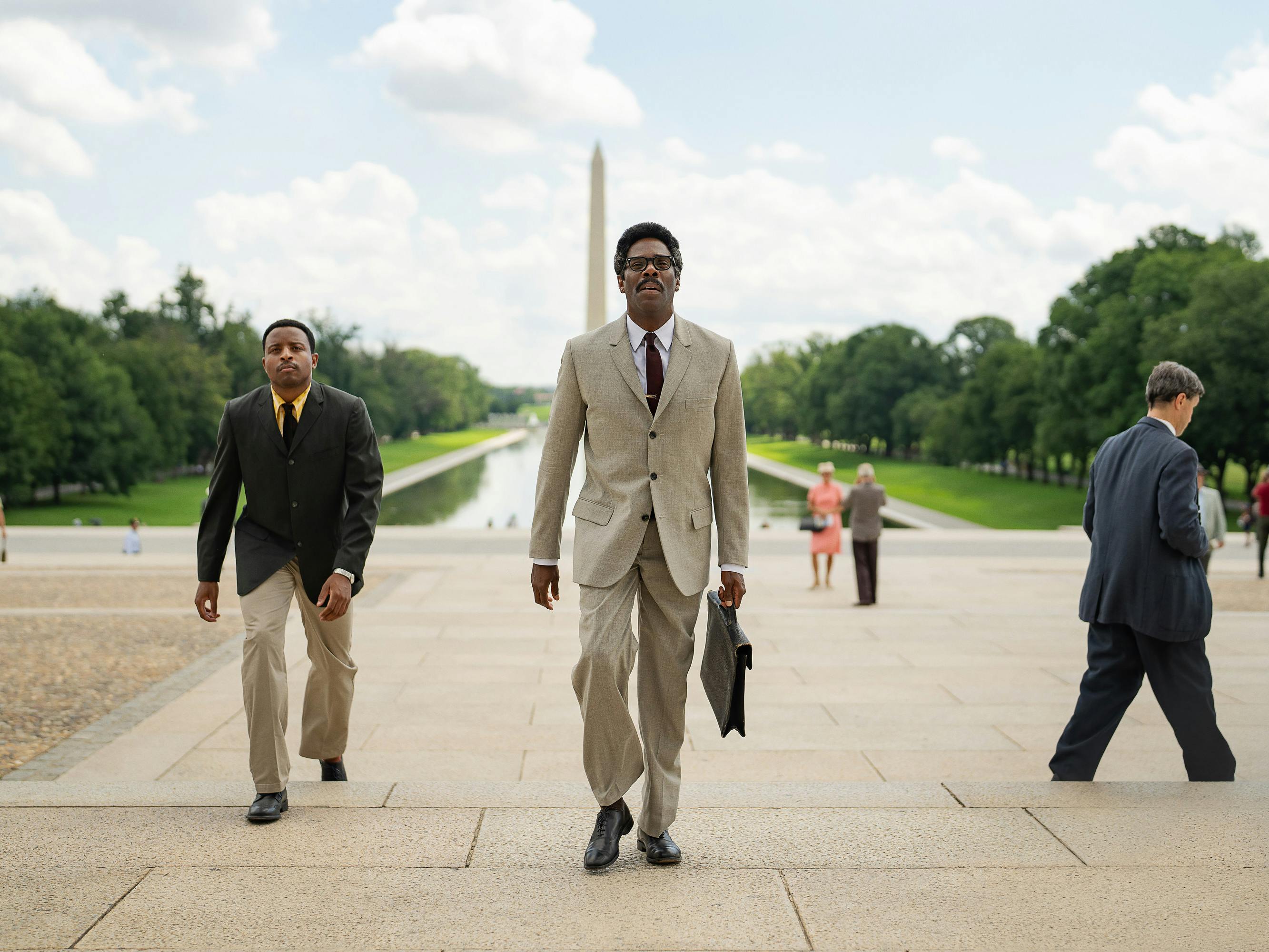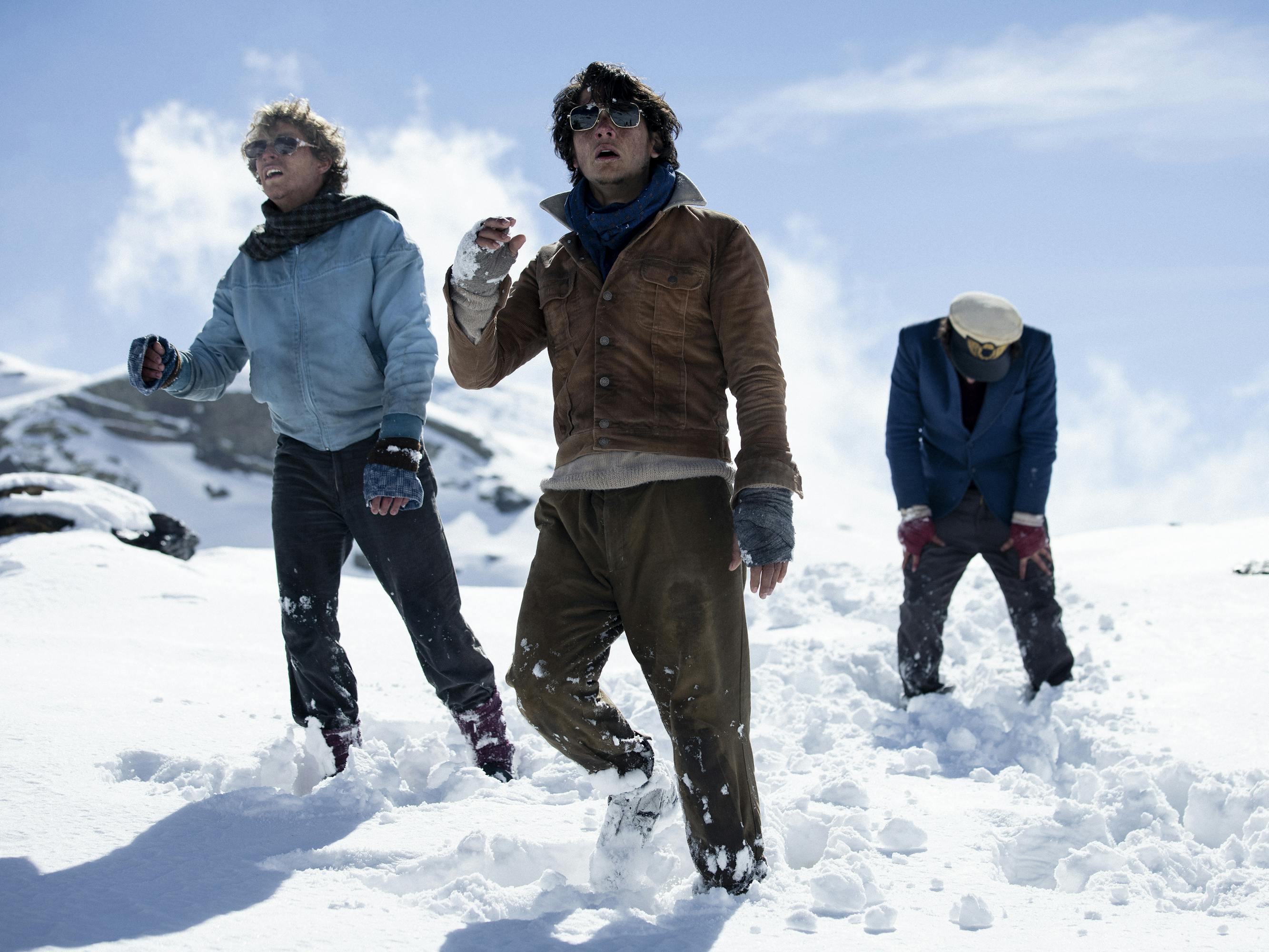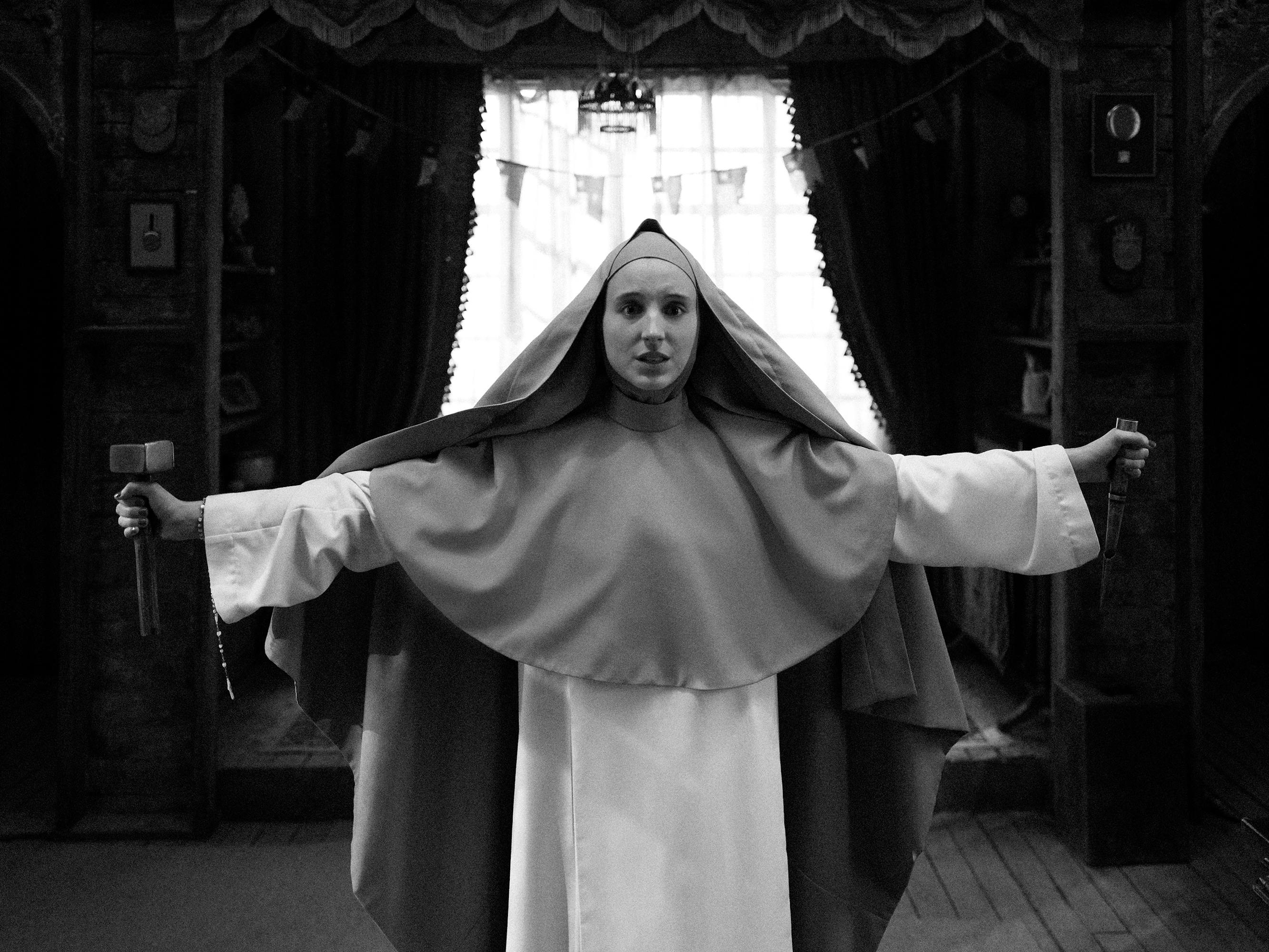Across the ten titles with 18 Academy Award nominations, vulnerability, artistry, and creativity prevailed.
When the nominations for the 96th Academy Awards were announced Tuesday morning, the makers of Maestro had much to celebrate, as Bradley Cooper earned three nominations for his work on the film, and became the fourth person to direct himself to an acting Oscar nomination on more than one film. The drama that chronicles the lifelong relationship between Leonard Bernstein and his actor-activist wife Felicia Montealegre Cohn Bernstein racked up a total of seven nods, including Best Picture.
A towering, fearless love story, Maestro showcases the arresting work delivered by Cooper as Leonard and Carey Mulligan as Felicia. In recognition of their unforgettable performances, Cooper was nominated for in the Actor in a Leading Role category, his fifth acting nod, while Mulligan was honored in the Actress in a Leading Role category, her third career nomination.
But Maestro was far from the only Netflix film recognized by Oscar voters: Powerful biographies Rustin and NYAD, as well as Todd Haynes’s sharply written dramedy May December also have cause to celebrate. Nominated, too, were J.A. Bayona’s harrowing real-life thriller Society of the Snow, the wildly inventive animated feature Nimona, and the impeccably crafted Wes Anderson short The Wonderful Story of Henry Sugar, among others.
In all, Netflix scored a total of 18 nominations. Here’s how it all broke down.
MAESTRO

In addition to his Best Actor and Best Picture nominations, Cooper received a nomination for Original Screenplay, shared with his co-writer Josh Singer (Spotlight). The filmmaker, who also produced the drama, says Leonard Bernstein’s creative fearlessness inspired him to make bold choices in his portrayal of the twentieth-century icon. “I understood from the beginning that there’s no way that the film can even harness or tether or encapsulate this man if it doesn’t have the same muscularity and build and fuselage that he had as an entity,” Cooper told Queue’s Krista Smith.
Showcasing the love story of Leonard and Felicia over the course of nearly half a century, the filmmakers worked closely with the couple’s children — Jamie, Nina, and Alexander — to faithfully bring them to the screen. “These were extraordinary people who had an extraordinary experience of the world,” says Mulligan. “But really what they had was just love and all the different ways in which love can be within a family, between siblings, between parents and their children. It’s all the richness of what a life lived together is like.”
Cooper assembled a world-class team of behind-the-scenes artisans, many of whom were recognized with nominations for their work on the film. “I take joy in everybody feeling like they are part of facilitating a vision,” Cooper says. “I love being a part of the acting side of that and helping a director to fulfill their vision, but as a director myself, I like to create a world where everybody comes to work, and they feel like their idea might be a major part of this movie.”
Among them was two-time Oscar-winning makeup artist Kazu Hiro (Darkest Hour, Bombshell), who designed and applied the prosthetics required to turn Cooper into Bernstein, a process that took roughly five hours as Hiro took the actor through decades of the masterful composer’s landmark experiences. Hiro, who was also previously nominated for Click and Norbit, earned his fifth career nomination for makeup as a core member of the film’s makeup and hairstyling team. “This is a dream job because it’s very rare for a film to go to the extent of following an entire life with the likeness of the protagonist,” Hiro told Queue. “It was an amazing life and love story, and we wanted to make it raw and real.”
Similarly, Felicia ages from a woman in her twenties into old age onscreen, but it was the film’s hair and makeup artists, Kay Georgiou and Lori McCoy-Bell, who oversaw Mulligan’s physical transformation and earned a Makeup and Hairstyling Oscar nomination for their work. Georgiou, a previous Oscar nominee for her work on the Cooper-produced Joker, and McCoy-Bell collaborated closely to ensure that Mulligan would look as natural, and believable, as possible. “There was quite a lot of work involved to make sure that she aged in tune with Lenny,” Georgiou says. “Each change had to complement his.”
No story about Leonard and Felicia could be told without exemplary sound, with music playing such a fundamental role in their lives. Maestro’s sound team — Richard King (sound designer/supervising sound editor); Jason Ruder (supervising music editor); Tom Ozanich (re-recording mixer); Dean Zupancic (re-recording mixer); and Steven A. Morrow (production sound mixer) — were nominated for their achievements in the film, which included recording a live orchestra for the extended sequence that sees Bernstein conducting in the United Kingdom’s Ely Cathedral.
The goal, explains Morrow — who, along with most of the other members of the sound team, had worked with Cooper on A Star Is Born — was to immerse the audience in the sound of Bernstein’s music. “You could hear and feel like you’re in the middle of the orchestra, and you can hear specific instruments as you’re getting closer or further away from them.”
Maestro’s stunning cinematography is no less impressive, and it’s earned the film’s director of photography, Matthew Libatique (Black Swan, A Star Is Born), his third Oscar nomination. The artistic shorthand he and Cooper developed on A Star Is Born enabled them to embrace risk in employing both black-and-white and color photography and capturing live concerts scenes and theatrical interludes, while never losing focus of the core of the narrative: the enduring love story between Leonard and Felicia.
MAY DECEMBER

May December achieves its genre-defying heights thanks to first-time screenwriter Samy Burch, who earned her first Academy Award nomination for Original Screenplay. In the film, Natalie Portman stars as Elizabeth Berry, a television actress who arrives in Savannah, Georgia to do research for an upcoming role. She’s set to play a younger version of Gracie Atherton-Yoo (Julianne Moore), a woman who, 20 years ago, was caught having a scandalous affair with a minor, whom she ultimately married. At the time May December is set, Gracie and husband Joe (Charles Melton) are on the cusp of becoming empty nesters, with their youngest children heading off to college. “There isn’t a big one-element takeaway,” Burch says of the film. “If anything, it’s just that everything is so complicated. There are the ripples of that as an audience member, as Elizabeth is trying to play this role, and even for Joe, who lived this experience. It’s really hard to get your grasp on ‘the truth.’ I hope that people have conversations about identity, celebrity, denial, and tabloid culture. There’s a lot to talk about.”
With a story by Burch and her partner Alex Mechanik, the script simmers with tension, artfully playing with elements of comedy and darkness throughout the melodrama. “I always knew I wanted to set it in the present, well after the tabloid event, and that just seemed like a way to bring some humor, maybe some of it more satirical, into the story,” explains the debut screenwriter. “Bringing in this Hollywood machine, it of course becomes so much about that and the way that we process these traumatic true crime events and feel the need to recreate them over and over.”
RUSTIN

For his starring role in George C. Wolfe’s Rustin, Emmy Award-winning character actor Colman Domingo receives his first Oscar nomination for portraying Bayard Rustin — the activist who organized the March on Washington and introduced Dr. Martin Luther King Jr. to passive resistance. Domingo says he felt a calling to play the man at the heart of the critically acclaimed drama from Higher Ground, which he comes to after an illustrious 30-plus-year career. “I feel like Bayard has been on my shoulder for years, saying, ‘You’re the one to tell my story,’” says the actor. Naturally, Domingo fully immersed himself in the role, capturing the spirit of Bayard much to the delight of his real-life partner Walter Naegle. “Colman’s portrayal encompasses Bayard’s militancy, dignity, eloquence, and humanity,” says Naegle. “It is really a complete and complex portrayal that will inspire people to get involved in the struggle for civil and human rights.”
“It’s really a lot of fun working with somebody who is fearless and has the wit and the command and the charisma and the showmanship that the lead character has as well,” says director Wolfe of his star. In telling the urgent story of one of the twentieth century’s most formative faces with rigor and grace, Domingo brings honor to a true hero. As producer Tonia Davis says, “We need to show that this country’s greatest achievements were made not only by the people that history has chosen to recognize, but also by the many that history has chosen not to recognize — people of color and people of all sexualities and gender identities.”
NIMONA

ND Stevenson first introduced the world to Nimona, a pink-haired shapeshifting teenager, in a 2012 Tumblr webcomic. In 2015, Nimona was published as a graphic novel that lived on the New York Times bestseller list and earned a nomination for the National Book Award for Young People’s Literature. Thanks to directors Nick Bruno and Troy Quane, and a dynamic animation style, the poignant hero now comes to life onscreen in the newly Academy Award-nominated animated feature.
“[Nimona is] about not having the limitations of your own body that everyone else has,” Stevenson says of his film and its eponymous character, voiced by Chloë Grace Moretz. “Who would you be if you didn’t have any of those limitations, if you could really choose to be anything at any given moment?” Set in a futuristic medieval kingdom, a knight named Ballister Boldheart (Riz Ahmed) teams up with the fiery Nimona after he finds himself falsely accused of a crime, and the pair attempt to clear his name. “[The story explores] what you can get out of the human connections that we have with people everywhere,” says executive producer and co-screenwriter Robert L. Baird, “from all walks of life, and not just in the bubble that makes us feel comfortable.”
NYAD

Academy Award nominees Annette Bening and Jodie Foster had never acted together before NYAD, but their onscreen connection — as Diana Nyad, the long-distance swimmer, and Bonnie Stoll, her confidant turned coach — was instant. At age 60, Nyad decided she would go after the swim that had proved elusive in her athletic heyday, a route from Cuba to Florida, and she wanted her closest friend, Stoll, to be the one to lead her support team. “She worked for a year to get ready for this, and it shows,” the real Nyad says of Bening’s commitment to the role. “She became a swimmer. She embraced the role.”
In Elizabeth Chai Vasarhelyi and Jimmy Chin’s NYAD, Bening and Foster — now nominated for Best Actress and Best Actress in a Supporting Role, respectively — not only delve into the force of unbridled determination but also the power of friendship as a propelling force. “I thought it was such a powerful story and just so completely unlike anything I had ever read,” says the now five-time Oscar-nominated Bening of her first encounter with the script, which is based on Diana’s memoir, Find a Way. “It was one of those immediate [responses], ‘Yes. Okay, I’ve gotta do this. I’ve gotta try to do this.’” Foster, who earned her first Academy Award nomination in almost 30 years, adds, “I really felt that with this, that we were channeling Diana and Bonnie’s story and that it had so much meaning for them and potentially so much meaning for other people.”
SOCIETY OF THE SNOW

J.A. Bayona’s harrowing survival film, Society of the Snow, was honored with a nomination in the International Feature category after being chosen as the official country selection of Spain. Based on the true story of a plane crash in the Andes mountains, the film details the two and a half months in which those who survived the initial impact suffered through the harshest of conditions as they held onto hope that they would be found. Bayona, who wrote and directed the film, spent time with the real-life survivors to ensure authenticity in his filmmaking. “This story could not be told from a distance,” he says. “We needed to fully immerse ourselves and to feel the cold, the hunger, and the isolation of the mountain.”
It took a talented team of craftspeople to continue to bring such authenticity and emotion to the film, including the makeup and hairstyling team of Ana López-Puigcerver, David Martí, and Montse Ribé, who picked up an Oscar nomination for their work. The team succeeded in bringing realism to the faces and bodies of the survivors and to those who were lost.
THE AFTER

First-time director Misan Harriman has received a Best Short Film nomination for his poignant depiction of grief, The After. Starring David Oyelowo, The After tells the story of Dayo, a London man who witnesses an unspeakable tragedy after which he must begin a journey of healing. Harriman, best known for his work as a celebrated portrait photographer, was moved to tell this story after witnessing the collective mental health crisis that has arisen in recent years. “I wanted to try and make something that at least lets you know that your story matters,” says Harriman. “It’s okay to have scars both visible and invisible. It is a direct reaction to my own mental health crisis and the need for people to feel safe in building themselves back up brick by brick.”
AMERICAN SYMPHONY

Full of heart, American Symphony’s story of resilience has earned a nomination for Best Original Song for Jon Batiste’s “It Never Went Away.” Director Matthew Heineman’s documentary, produced by Higher Ground Productions, follows Batiste as he sets off to write and perform his American Symphony at Carnegie Hall, only for the lauded musician and his wife, the Emmy-winning journalist Suleika Jaouad, to learn that her cancer has returned. The film is a moving portrait of love and the creative process, which Batiste encapsulates in his new ballad. “Something so special has been poured into this film that it’s indescribable with words,” he told Queueat American Symphony’s New Orleans premiere. “Music is the universal language that inspired me to want to write.”
THE WONDERFUL STORY OF HENRY SUGAR

Wes Anderson’s latest film may be short, but the charming tale finds the writer-director at his peak powers and has earned him an Oscar nomination in the category of Live Action Short Film. The Wonderful Story of Henry Sugar transforms Roald Dahl’s wondrous tale for the screen, with all the magic of Anderson’s style and stunning sets and featuring an all-star cast: Benedict Cumberbatch, Dev Patel, Ben Kingsley, Ralph Fiennes, and Richard Ayoade. “This is part of the thing for people who know Henry Sugar,” says Anderson. “They very likely have tried to look through the back of a playing card or stare at a candle flame to develop this power, to do the thing in the story. It’s got that kind of hook.”
Henry Sugar joins the ranks of Anderson’s impressive short film catalog which includes Castello Cavalcanti (2013), Hotel Chevalier (2007), and Bottle Rocket (1993), a proof-of-concept short version of his 1996 directorial debut.
EL CONDE

Edward Lachman brought decades of experience working with world-renowned auteurs to El Conde, Pablo Larraín’s black-and-white satire of Chilean dictator Augusto Pinochet, now nominated for Best Cinematography, making Lachman a three-time Oscar nominee. Reimagined as a vampire, Pinochet soars through the Patagonian sky and hunts cities for human hearts, all of which Lachman captured using a camera and lens system dreamed up and commissioned by the cinematographer himself. Lachman “let the black and white be way more than an interesting aesthetic choice,” remarks Larraín, the film’s director. “It took it to a very serious perspective of photography, of history, and that makes the movie more universal.”




